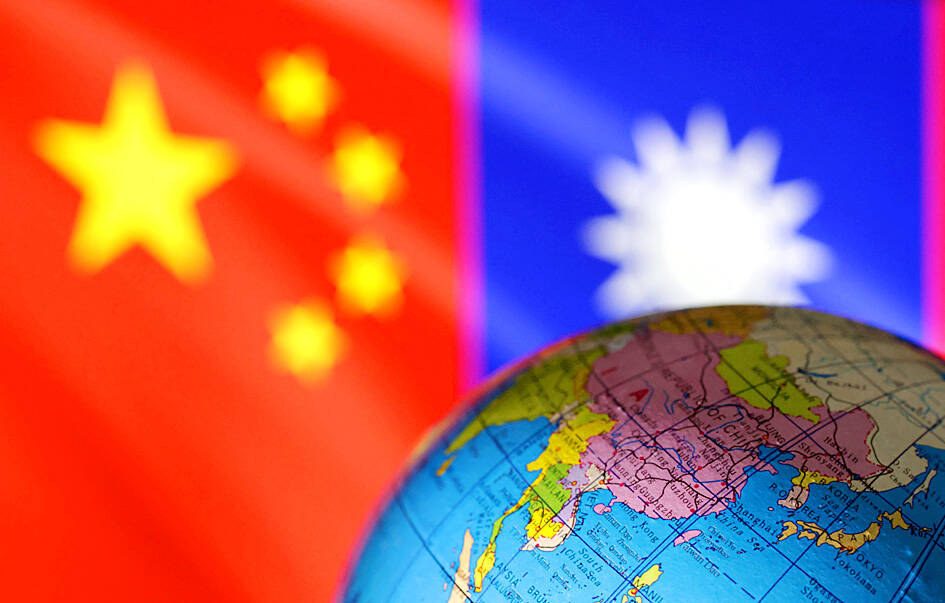Taiwan and the US are converging on views related to Taiwan’s defense needs, with both sides agreeing that asymmetric capabilities alone are not enough, a source said on Saturday.
The so-called “porcupine approach” to Taiwan’s defense that would seek to make an invasion a costly prospect for China is gradually being abandoned by both sides, in favor of the view that Taiwan should also enhance traditional combat capabilities, the source said.
That change in views has been fueled by China’s escalation of “gray zone” tactics, and has culminated in strengthened Taiwan-US defense cooperation, such as in the development of Taiwan’s first domestically produced submarine.

Photo: Reuters
“If our country and territorial waters are like a house with a yard, then we should be projecting our forces outward as if building a fence around that yard,” the source said. “The porcupine approach would have the enemies enter our yard before we even take action, drastically reducing the space and time for a response.”
Also, China would likely respond to a porcupine defense approach by attempting to blockade Taiwan and starve it of supplies, they said.
The navy should build larger vessels that would help it project its strength outward and keep enemy forces beyond Taiwan’s territorial waters, they added.
“If the Chinese People’s Liberation Army Navy is approaching Taiwan, we will not be able to repel them using smaller vessels, so we will need a larger fleet of medium and large ships,” the source said.
Penghu County would also be incorporated into defense strategies that would aim to push its zone of defense toward the enemy, the source said.
“In the future, we will develop a mixed approach to defense that will incorporate both basic combat capabilities and asymmetric capabilities,” they said.
The US’ concepts of asymmetrical warfare is rooted in monitoring conflicts between Israel and its neighbors, which has partly informed the change in Washington’s view on Taiwan’s defense., the source said, adding that aircraft carriers were not involved in those conflicts due to the geographical conditions compared with Taiwan.
A Taiwan-China conflict would largely be fought at sea, and China would continue to normalize encroachments leading up to such a conflict using “gray zone” tactics, so Taiwan would need large ships to respond to those threats, they said.
The first domestically made submarine launched last week is also an important result of the consensus between the countries, they said.
“The launch of Taiwan’s first domestically built submarine is testament to the country’s cooperation and consensus with the US on Taiwan’s defense. We must continue to strengthen that cooperation and improve our combat abilities,” the source said.

Taiwan is stepping up plans to create self-sufficient supply chains for combat drones and increase foreign orders from the US to counter China’s numerical superiority, a defense official said on Saturday. Commenting on condition of anonymity, the official said the nation’s armed forces are in agreement with US Admiral Samuel Paparo’s assessment that Taiwan’s military must be prepared to turn the nation’s waters into a “hellscape” for the Chinese People’s Liberation Army (PLA). Paparo, the commander of the US Indo-Pacific Command, reiterated the concept during a Congressional hearing in Washington on Wednesday. He first coined the term in a security conference last

Prosecutors today declined to say who was questioned regarding alleged forgery on petitions to recall Democratic Progressive Party (DPP) legislators, after Chinese-language media earlier reported that members of the Chinese Nationalist Party (KMT) Youth League were brought in for questioning. The Ministry of Justice Investigation Bureau confirmed that two people had been questioned, but did not disclose any further information about the ongoing investigation. KMT Youth League members Lee Hsiao-liang (李孝亮) and Liu Szu-yin (劉思吟) — who are leading the effort to recall DPP caucus chief executive Rosalia Wu (吳思瑤) and Legislator Wu Pei-yi (吳沛憶) — both posted on Facebook saying: “I

The Ministry of Economic Affairs has fined Taobao NT$1.2 million (US$36,912) for advertisements that exceed its approved business scope, requiring the Chinese e-commerce platform to make corrections in the first half of this year or its license may be revoked. Lawmakers have called for stricter enforcement of Chinese e-commerce platforms and measures to prevent China from laundering its goods through Taiwan in response to US President Donald Trump’s heavy tariffs on China. The Legislative Yuan’s Finance Committee met today to discuss policies to prevent China from dumping goods in Taiwan, inviting government agencies to report. Democratic Progressive Party Legislator Kuo Kuo-wen (郭國文) said

The Ministry of Economic Affairs has fined Taobao NT$1.2 million (US$36,900) for advertisements that exceeded its approved business scope and ordered the Chinese e-commerce platform to make corrections in the first half of this year or its license would be revoked. Lawmakers have called for stricter supervision of Chinese e-commerce platforms and more stringent measures to prevent China from laundering its goods through Taiwan as US President Donald Trump’s administration cracks down on origin laundering. The legislature’s Finance Committee yesterday met to discuss policies to prevent China from dumping goods in Taiwan, inviting government agencies to report on the matter. Democratic Progressive Party